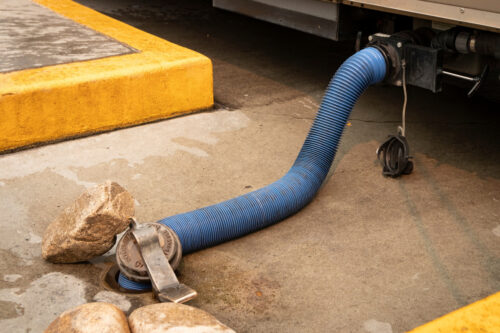When planning an RV trip, one of the most important considerations is, do RV parks have sewer hookups? Sewer hookups are essential for many RV travelers, as they provide a convenient way to manage waste without frequent trips to a dump station.
While many RV parks offer this amenity, the availability can vary depending on the park’s location, size, and level of services. In this article, we’ll dive into what you need to know about sewer hookups at RV parks, how to identify parks that offer them, and tips to ensure a seamless RVing experience.
Sewer hookups are connections provided at certain RV parks that allow you to dispose of your RV’s wastewater directly into the park’s sewage system. These hookups are usually located at your campsite, making it convenient to manage waste without the need for portable tanks or trips to a centralized dump station.
A typical full hookup site will include sewer, water, and electric connections, ensuring you have access to all the essential utilities during your stay.
Rv Parks with Sewer Hookups
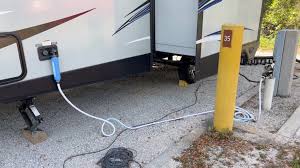
When researching RV parks with sewer hookups, you’ll want to focus on parks that offer full hookups, which typically include sewer, water, and electrical connections. Sewer hookups are especially important for long-term stays or travelers who want the convenience of not needing to dump their tanks manually.
Here are some features and types of RV parks with sewer hookups:
- Full-Service RV Parks: These parks offer a complete range of utilities, including sewer hookups. They are often designed for longer stays or full-time RV living.
- State and National Parks: Some state and national parks have upgraded RV sites with sewer hookups, though availability can vary depending on the location.
- Private RV Parks and Resorts: Many private parks provide full hookups, including sewer, and cater to a range of budgets and experiences, from basic to luxury.
- Commercial RV Parks: These parks typically focus on amenities for convenience and comfort, offering sewer hookups along with other services like Wi-Fi, cable, and laundry.
- Destination RV Resorts: High-end resorts focused on providing luxurious amenities often include sewer hookups, along with extra services like pools, spas, restaurants, and activities.
When looking for a park with sewer hookups, be sure to verify the availability and amenities ahead of time, as some parks may have only a portion of their sites with sewer connections, or offer them for an additional fee.
If you’re planning a longer stay, parks with sewer hookups will make your trip more comfortable.
Do All Rv Parks Have Sewer Connections
No, not all RV parks have sewer connections. While many modern RV parks offer full hookups (including water, sewer, and electricity), some parks may only provide partial hookups, which might not include a sewer connection. These parks may offer water and electricity but require RV owners to use a dump station for waste disposal.
Here are a few types of RV parks and the availability of sewer hookups:
- Full-Service RV Parks: These parks typically offer full hookups, including water, electricity, and sewer. They are the most convenient for long-term stays or RVs with large waste tanks.
- Partial Hookup Parks: These parks may offer water and electricity but do not have sewer connections at individual sites. Instead, they may have a central dump station where RV owners can empty their tanks.
- Primitive or Dry Campgrounds: Some campgrounds, especially those in more remote areas or national parks, may not offer any hookups, including sewer. In these cases, RV owners are usually responsible for waste disposal and may need to use a nearby dump station.
- Mobile Home Parks: Some mobile home parks may have sewer connections but not necessarily cater to RVs, so they might not always have RV-specific amenities like power and water hookups at each site.
It’s important to confirm the amenities available at each RV park before booking a site, especially if you require a sewer connection for your RV.
Rv Parks Sewer System Availability
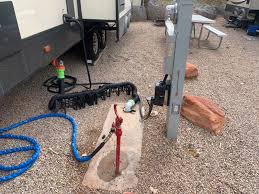
When choosing an RV park for your trip, understanding the availability of sewer systems is essential for a smooth and comfortable experience. Not all parks offer sewer hookups, and the type of system in place can vary based on the park’s size, location, and the services they offer.
Here’s a closer look at the sewer system availability in RV parks and what you should consider when planning your stay.
Types of Sewer Systems in RV Parks
- Full Hookup Sites
- These sites include water, electricity, and sewer hookups, allowing RVers to stay comfortably without worrying about managing waste. Full hookup sites are typically found in larger, more developed private RV parks and resorts.
- How it works: The sewer line connects directly to your RV’s black and gray water tanks, allowing waste to flow into the park’s sewage system. Once connected, your waste is disposed of automatically as you use your RV’s facilities.
- Partial Hookup Sites
- Some RV parks provide partial hookups, meaning only water and electricity are available, with no sewer connection. In these parks, you may need to rely on a portable waste tank or use a nearby dump station to empty your RV’s waste tanks.
- How it works: You’ll need to store your waste in holding tanks and dispose of it at a dump station located within the park or nearby. These sites are more commonly found in state parks, national parks, or rustic campgrounds.
- No Hookups (Dry Camping or Boondocking)
- These sites have no water, electricity, or sewer hookups. They are often found in remote locations or areas where RVs are expected to be self-sufficient.
- How it works: You’ll need to rely on your RV’s built-in systems (holding tanks for water and waste) and manage waste disposal independently. There are usually dump stations within a reasonable distance where you can empty your tanks once full.
Factors Affecting Sewer System Availability
- Location of the Park
- Urban and Suburban Parks: These tend to offer more complete amenities, including sewer hookups, as they cater to long-term RVers and travelers who expect modern conveniences.
- Rural and Remote Parks: Often focus on preserving natural settings, and might offer fewer services. You might find more campsites without sewer connections in state or national parks.
- Size of the Park
- Larger RV parks or resorts often provide full hookups, including sewer systems, to accommodate the volume of visitors and the infrastructure required. Smaller, family-owned parks or campgrounds may not offer sewer connections and may rely on more basic systems.
- Type of RV Park
- Private RV Parks & Resorts: These are more likely to offer full sewer hookups as they cater to guests with all types of RVs, including larger rigs that require more services.
- State and National Parks: These parks often have limited amenities, especially in remote areas, with sewer hookups being less common. However, some may have centralized dump stations where you can empty your tanks.
- Boondocking Sites: Typically, these sites are in natural settings, such as forests or deserts, where no infrastructure exists for sewer hookups. RVers are expected to be self-reliant for waste disposal.
What is a sewer hookup at an RV park?
A sewer hookup at an RV park is a system that allows RVers to dispose of their wastewater directly into the park’s sewer system, rather than needing to manually empty their RV’s holding tanks at a dump station. These hookups are crucial for maintaining hygiene and convenience during long stays, as they eliminate the need to relocate the RV to a separate disposal station.
Full Details on Sewer Hookups:
- Types of Wastewater in RVs:
- Black Water: This is the wastewater from toilets, which contains human waste and toilet paper.
- Gray Water: This is the wastewater from sinks, showers, and other appliances, which is generally free of solids but may contain food particles, soap, grease, and dirt.
- Sewer Hookup Components:
- Sewer Pipe (Dump Line): This is a dedicated pipe that runs underground in the RV park and connects to each individual sewer hookup.
- RV Sewer Hose: The hose is used to connect the RV’s waste tank outlet to the sewer hookup. It typically has a 3-inch diameter and is made of durable, flexible material to prevent leaks and damage.
- Sewer Fitting (Adapter): The sewer fitting is the part where the RV’s hose connects to the park’s sewer system. The most common type is a threaded or bayonet fitting, ensuring a secure and leak-proof connection.
- Gray and Black Water Inlets: Some RV parks provide separate inlets for gray and black water, while others combine both into a single connection.
- Setup Process:
- Hose Connection: To use a sewer hookup, RV owners will attach one end of the sewer hose to their RV’s waste outlet and the other end to the park’s sewer pipe or connection point.
- Securing the Hose: Once the hose is connected, it’s important to secure the connection to prevent leaks or disconnection. Some RV parks will provide a cap or fitting to help ensure a snug, leak-free seal.
- Emptying the Tanks: The RV owner will open the black water valve first to allow waste to flow into the sewer line, followed by the gray water valve to flush any remaining residue and clean the hose.
- Benefits of a Sewer Hookup:
- Convenience: RVers don’t need to manually dump their waste at a designated dump station. They can stay connected to the sewer system for as long as needed, which is especially useful for long stays.
- Comfort: Having a sewer hookup eliminates the need for regular trips to a dump station, providing a more comfortable and stress-free experience during the stay.
- Odor Control: Properly disposing of wastewater via a sewer hookup minimizes odors that can occur when holding tanks are left unchecked for too long.
- Considerations:
- Hose Length: RV owners must ensure their sewer hose is long enough to reach the park’s sewer connection. Typically, a 15-20-foot hose should suffice, but longer hoses may be necessary for larger RVs or parks with spread-out hookups.
- Quality of Sewer Hookup: Not all RV parks have modern, well-maintained sewer hookups. Always check for signs of wear, leaks, or clogs to avoid potential problems.
- Wastewater Tank Management: Even when connected to a sewer hookup, it’s still important for RV owners to monitor their wastewater tanks to ensure they aren’t overfilled or malfunctioning.
- Safety & Environmental Considerations:
- Proper Disposal: Never dispose of anything other than waste and water into the sewer system. Items like cooking oils, chemicals, or non-biodegradable materials should not be flushed into the park’s sewer system.
- Regular Hose Maintenance: It’s important to regularly clean the sewer hose after each use to prevent build-up of waste or bacteria. Some RVers use a flushing system to clean their hoses, while others may use special cleaners.
- Sewer Hookup Variations:
- Full Hookup Sites: Many RV parks offer full hookup sites, which include water, electricity, and sewer hookups. These are ideal for those who plan to stay for extended periods.
- Partial Hookup Sites: Some parks only offer water and electricity, requiring RVers to either use their onboard tanks or visit a dump station for waste disposal.
- Sewer Dumps at Dump Stations: For parks without sewer hookups at individual sites, RVers must use a central dump station, where they can empty their tanks.
Are sewer hookups available at all RV parks?
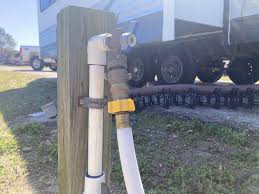
Not all RV parks offer sewer hookups, and the availability of such hookups depends on the type of RV park, its location, and its amenities.
Here’s a detailed breakdown:
1. Full Hookups (Water, Electricity, and Sewer)
- Full Hookup RV Parks: These parks provide the most comprehensive amenities, offering water, electricity, and sewer hookups. This setup allows RVers to stay for extended periods without worrying about waste disposal. Sewer hookups allow you to drain your RV’s waste directly into the park’s sewer system, eliminating the need to manually dispose of waste at a dump station.
- Benefits:
- Comfort of not needing to use external facilities for waste disposal.
- Longer stays are possible, as you don’t need to worry about running out of fresh water or needing to empty your black and gray water tanks.
- Ideal for full-time RVers or those on extended trips.
- Benefits:
2. Partial Hookups (Water and Electricity)
- Partial Hookup RV Parks: These parks provide water and electricity, but they do not offer sewer hookups. In these parks, RVers will need to find alternative ways to dispose of waste, typically using a dump station within or near the park.
- Benefits:
- Suitable for shorter stays or those who don’t mind emptying their tanks manually.
- Often less expensive than full-hookup parks.
- Challenges:
- You need to monitor your wastewater tanks and be prepared to visit a dump station when they’re full.
- Limited conveniences compared to full-hookup parks.
- Benefits:
3. No Hookups (Dry Camping)
- No Hookup or Primitive RV Parks: Some parks, especially in more remote or natural areas, may not provide any hookups at all (water, electricity, or sewer). These are also known as “dry camping” sites. They are typically found in national parks, forests, or recreational areas where preservation of the environment is a priority.
- Benefits:
- Often located in scenic, less developed areas.
- Lower cost for camping in more remote or natural settings.
- Challenges:
- RVers need to rely on their RV’s built-in systems (water tanks, generator, and waste holding tanks).
- You’ll need to plan for waste disposal by using off-site dump stations or portable waste tanks.
- Less comfort compared to parks with hookups.
- Benefits:
4. Dump Stations
- Even in parks without sewer hookups, many RV parks or nearby areas offer dump stations. These are designated areas where RVers can dispose of their waste. Some parks include a dump station as part of their amenities, while others may charge a small fee for its use.
- How it works: Dump stations typically allow RVers to connect their RV’s waste hose to a sewer line, flush out the black and gray water tanks, and then continue their journey. Some parks with partial or no hookups may have dump stations located conveniently for guests.
- Location: If you are staying at an RV park without sewer hookups, it’s essential to check if they provide a dump station and where it is located. You may need to plan trips to the dump station periodically.
5. Why Some RV Parks Lack Sewer Hookups
- Cost: Installing and maintaining sewer systems is costly. Smaller or more budget-friendly parks may not offer full hookups because they can’t afford the infrastructure.
- Location: Parks in more remote or natural settings may lack the infrastructure needed for sewer connections. These parks often focus on providing a more “back-to-nature” experience, emphasizing less-developed amenities.
- Environmental Considerations: In some cases, environmental regulations prevent the installation of sewer hookups in certain areas to preserve natural resources or minimize the impact on the land.
6. What to Consider When Booking
- Length of Stay: If you’re planning a short stay, a partial hookup or no-hookup park might work fine. However, if you plan to stay longer, especially with a family or in a larger RV, a full hookup park with sewer connections will offer more convenience.
- Tank Size: If you’re staying at a park without sewer hookups, check your RV’s black and gray water tank capacity to ensure you’ll have enough room for waste before needing to visit a dump station.
- Dump Station Access: Verify if a nearby dump station is available, especially in more remote locations. Some parks may charge extra for this service, while others offer it free of charge.
Can I leave my RV connected to the sewer hookup for an extended period?
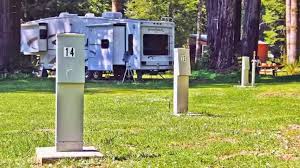
Yes, you can leave your RV connected to the sewer hookup for an extended period, but there are a few considerations to keep in mind:
- Proper Sealing: Ensure that the connection between your RV and the sewer hookup is properly sealed to prevent leaks and odors. You should always use a high-quality sewer hose with a secure, leak-proof connection. A hose with a clear elbow is often recommended to easily check for blockages or clogs.
- Check for Clogs: Over time, waste and residue can build up in your RV’s sewer system or the sewer hose. If you leave your RV connected to the sewer for long periods, you may risk clogs or backups. It’s important to periodically check and maintain the system to avoid blockages.
- Sewer Tank Management: Even when connected to a sewer hookup, you still need to monitor the waste levels in your RV’s black and gray tanks. If you are staying at a campground or RV park with a sewer connection, some people prefer to leave their black tank valve closed to avoid waste draining too quickly, which can cause solids to settle and create clogs. Others may choose to leave the valve open so waste continuously drains.
- Avoid Overflows: If you’re keeping the sewer hookup connected, make sure the system is functioning well and there are no issues with drainage. Regularly checking the connection and making sure there are no obstructions or problems can prevent unpleasant situations.
- Odor Prevention: Leaving the black tank valve open can sometimes cause odors to enter the RV because the air pressure in the tank is constantly fluctuating. To combat this, consider using a vent cap or valve designed to prevent odors while still allowing waste to drain.
- Environmental Factors: If you are staying in an area with extreme weather conditions, make sure your sewer connection and hose are protected from freezing temperatures. Freezing pipes can lead to ruptures, leaks, or other damage.
- RV Usage: If you’re not using the RV often, it’s good practice to periodically flush the system to keep everything in good working order and prevent odors from building up.
It’s safe to leave your RV connected to a sewer hookup for extended periods if you maintain it properly, check for clogs, and manage tank levels appropriately. Proper care and regular maintenance can ensure everything continues to function without issues.
Conclusion
If you’re wondering, “Do RV parks have sewer hookups?” the answer is generally yes, as most RV parks provide this essential amenity. Sewer hookups are crucial for allowing campers to easily dispose of wastewater, including gray and black water, directly from their RVs.
This feature enhances the overall convenience and comfort of the RV camping experience. However, it’s always a good idea to check in advance, as some RV parks may offer only partial or no sewer hookups, requiring alternative waste disposal options. Knowing the amenities available ensures a smoother and more enjoyable stay.

